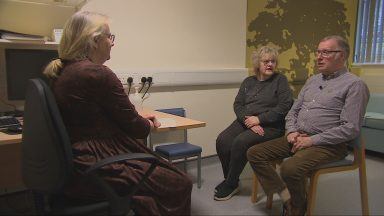An “exceptional” young African footballer has lost his legal battle to be allowed to come to Scotland to have trial with professional clubs.
Lawyers acting for Mohammed Camara, 23, went to the Court of Session to overturn a January 2022 decision preventing him from travelling to the UK.
The Guinean national’s legal team claimed that Priti Patel – the then home secretary – was mistaken in her decision not to allow their client to come to the UK.
The Tory politician made her decision after Mr Camara’s lawyers failed to provide her staff with information from the Scottish teams that were interested in giving him a trial.
She also made her decision after failing to receive sufficient information about his career to date and how he supported himself in his home country.
The court had heard how Mr Camara had returned to Guinea during the pandemic and was unable to produce evidence from the football teams who were interested in assessing his abilities.
Lawyers for Mr Camara claimed that the home secretary was mistaken – advocate Alan Caskie said that Scottish teams didn’t provide such information for fear of tipping off rivals about talented unsigned talent.
In a written judgment published by the court on Tuesday, judge Lady Carmichael upheld the decision made by the Home Office.
Lady Carmichael wrote: “The secretary of state cannot be criticised for not having taken that matter into account. That explanation was not before her at all.
“It was not unreasonable to ask for confirmation from at least one club of the offer of a trial.
“On the hypothesis that the explanation for the absence of that is correct, there would be nothing obviously preventing Mr Camara from obtaining a letter from a football club stating that it is their policy neither to confirm nor deny that they have offered a trial and/or that that is normal practice in the industry.
“I am not satisfied that the secretary of state acted unreasonably in refusing to grant the application on the basis of the information provided to her.
“None of the documents submitted in support of Mr Camara’s application names any team for which he has played.
“There is no mention of what position or positions he plays in. It is not unreasonable for the secretary of state to require vouched detail about matters of that sort where an application is for entry clearance to undergo trials with professional clubs.”
The judgement tells of how Mr Camara has been trying to come to Scotland since 2018.
In support of his application for a visa, the footballer’s lawyers said that former Celtic player Mo Camara was acting as a scout for a professional team.
He said he had indicated an interest in seeing their client play.
His application was also supported by a journalist and documentary maker called William McBain.
Mr McBain was making a documentary about ‘exceptional’ young African footballers and that Mr Camara was the ‘main protagonist’. African scouts and managers said they expected him to play at the highest level.
However, the home secretary didn’t receive notification from the teams who were supposedly interested in giving Mr Camara a trial.
Mr Camara’s advocate, Caskie, told the court that football clubs would not provide written evidence that they had offered players a trial.
He said this was the “deliberate and normal practice” of football club and that they did this because of “commercial sensitivities.”
Explaining Mr Caskie’s submission, Lady Carmichael wrote: “If they confirmed that they had offered someone a trial, that might assist rival clubs in identifying talented, unsigned players.
“Further, circumstances might alter so that the club were no longer seeking someone to fill a particular role, and they would not wish to have committed to providing a trial.”
Lawyers for the Home Office told the court that Patel made the correct decision.
Lady Carmichael agreed.
She wrote: “The secretary of state was entitled to regard the explanation for the absence of evidence about Mr Camara’s current or last team – that Mr Camara had returned to Guinea due to the coronavirus pandemic and was therefore unable to produce letters from the football clubs he has played for – as unsatisfactory.
“It is not obvious from that explanation why he would have no documentary record of having played for particular clubs, or why his presence in Guinea would necessarily prevent him or his solicitors from approaching those clubs for a letter confirming that he had played for them.
“That said, however, the fact that Mr Camara did not have a job that provided him with a financial incentive to return was clearly a relevant factor for the decision maker to assess as part of the whole circumstances of the application.
“I refuse the petition.”
Follow STV News on WhatsApp
Scan the QR code on your mobile device for all the latest news from around the country



 SNS Group
SNS Group

























